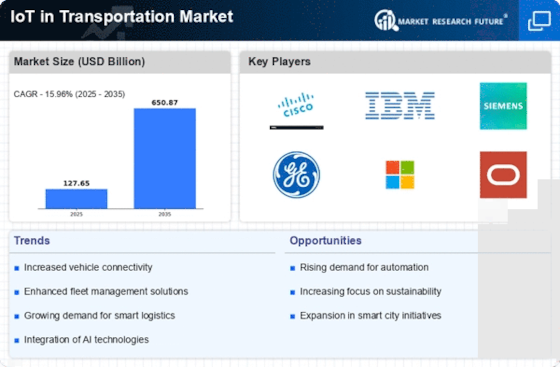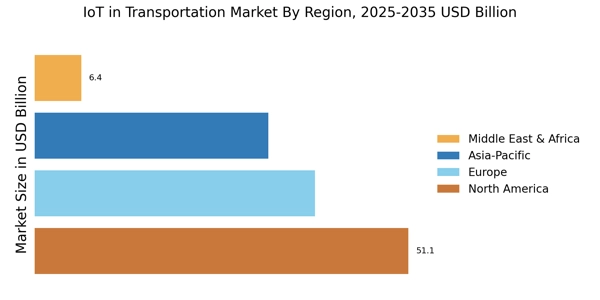Emergence of Autonomous and Electric Vehicles
The emergence of autonomous and electric vehicles represents a transformative driver for the IoT in Transportation Market. As manufacturers invest heavily in research and development, the integration of IoT technologies in these vehicles enhances their functionality and safety. Autonomous vehicles rely on a network of sensors and IoT devices to navigate and make real-time decisions, which is expected to revolutionize the transportation sector. By 2030, it is projected that the market for autonomous vehicles could reach USD 60 billion, with IoT playing a pivotal role in their operation. Additionally, the rise of electric vehicles, supported by IoT-enabled charging infrastructure, is likely to reshape consumer preferences and drive further innovation in the transportation landscape.
Increased Demand for Real-Time Data Analytics
The IoT in Transportation Market experiences a surge in demand for real-time data analytics, driven by the need for enhanced decision-making capabilities. Companies are increasingly leveraging IoT technologies to gather and analyze data from various sources, including vehicles, infrastructure, and traffic systems. This data enables transportation operators to optimize routes, reduce fuel consumption, and improve overall efficiency. According to recent estimates, the market for IoT analytics in transportation is projected to reach USD 20 billion by 2026, reflecting a compound annual growth rate of approximately 25%. The ability to harness real-time data not only enhances operational efficiency but also contributes to improved safety and customer satisfaction, making it a pivotal driver in the IoT in Transportation Market.
Rising Adoption of Smart Transportation Systems
The IoT in Transportation Market is witnessing a rising adoption of smart transportation systems, which integrate IoT technologies to enhance urban mobility. Smart traffic management systems utilize IoT sensors to monitor traffic flow and adjust signal timings dynamically, thereby reducing congestion. Recent studies indicate that cities implementing smart transportation solutions have experienced a reduction in traffic delays by up to 30%. Furthermore, the integration of IoT in public transportation systems allows for real-time tracking of buses and trains, improving the overall passenger experience. As urban populations continue to grow, the demand for efficient and smart transportation solutions is likely to escalate, further driving the IoT in Transportation Market.
Advancements in Vehicle Connectivity Technologies
Advancements in vehicle connectivity technologies are a crucial driver for the IoT in Transportation Market. The integration of 5G networks and improved communication protocols facilitates seamless connectivity between vehicles and infrastructure. This connectivity enables features such as vehicle-to-everything (V2X) communication, which enhances safety and traffic management. As of 2025, it is anticipated that over 50% of new vehicles will be equipped with advanced connectivity features, significantly impacting the transportation landscape. The ability to communicate in real-time with traffic signals, other vehicles, and even pedestrians enhances situational awareness and reduces the likelihood of accidents. Consequently, the proliferation of connected vehicles is expected to propel the growth of the IoT in Transportation Market.
Growing Focus on Sustainability and Environmental Impact
The IoT in Transportation Market is increasingly influenced by a growing focus on sustainability and reducing environmental impact. As governments and organizations strive to meet stringent emissions regulations, IoT solutions are being adopted to monitor and manage vehicle emissions effectively. For instance, smart sensors can track fuel consumption and emissions in real-time, allowing for timely interventions. The market for green transportation solutions is expected to grow significantly, with estimates suggesting a potential increase of over 30% in the next five years. This emphasis on sustainability not only aligns with regulatory requirements but also resonates with consumers who are becoming more environmentally conscious, thereby driving the adoption of IoT technologies in transportation.

















